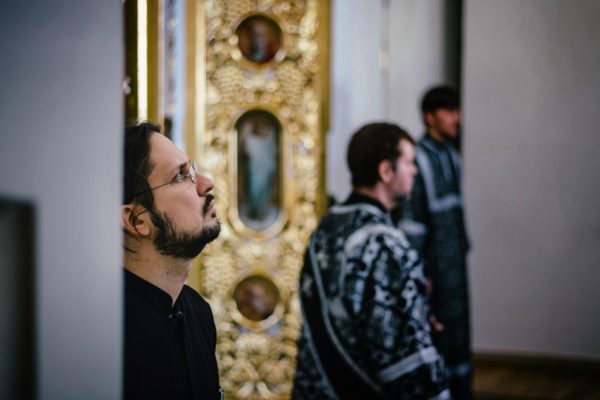This reading is preceded by a touching discourse on the faith, in which the Apostle Paul explains the greatness of God’s grace that is directed to all humans so that they may transform out of their selfishness and fleshly self-love through participation in the event of Christ’s death and resurrection. Our God in whom we believe is the God who came down and became “sin” and “condemnation” for our sake, so that in Him we may become God’s righteousness:
For He made Him who knew no sin to be sin for us, that we might become the righteousness of God in Him. (2 Corinthians 5:21).
This event constitutes the essence of the Gospel to which the Apostle Paul was consecrated to preach and from which he draws all his decisions.
Therefore he says at the beginning of this Epistle reading, “We then, as workers together with Him also plead with you not to receive the grace of God in vain.”
These words epitomize the Apostle of the Gentiles’ feeling of responsibility because of his certainty that his partner in work in none other than the almighty God and that his sole purpose is for grace to be fixed in those who have accepted the Gospel and have started the path of change in their life and their priorities. For their part, the believers must not disparage the grace of salvation that they have attained “at an acceptable time” for God.
When grace descends, we must not oppose it. The Apostle Paul reminds us of this, that we are not the ones who determine the appropriate time for God’s work in our life and the time of our repentance.
The matter of times and seasons is in God’s domain, since He is the one who is pleased, “at an acceptable time and in the day of salvation,” to incline toward our misery and rescue us.
When grace touches our hearts, we must not harden our hearts, we must not procrastinate or delay. The Apostle continues, highlighting the responsibility of the evangelist to uphold believers in grace.
He says, “We give no offense in anything, that our ministry may not be blamed.” That is, that there not be suspicions about the motives for service that would scandalize the faithful and limit the enthusiasm of their commitment to their baptismal vow. For this reason, the Apostle informs the faithful of Corinth about his constant eagerness, along with his companions, to be truly servants of God. To achieve this endeavor, the Apostle does not care about his own personal needs, his circumstances or the hardships he is subjected to, since his inspiration is Christ who came down for our sake.
On the other hand, the Apostle struggles so that the clay vessel of his body may be pure, “in labors, in sleeplessness, in fastings; by purity, by knowledge, by longsuffering, by kindness, by the Holy Spirit, by sincere love, by the word of truth, by the power of God, by the armor of righteousness on the right hand and on the left.”
In this way, there does not remain any doubt about the credibility of his message to the faithful, who see his devotion, his self-denial and the holiness of his way of life among them. The enthusiasm of his spiritual struggle springs from his apostolic zeal and his love for the one who sent him, Jesus Christ, and nothing separates him from them.
He bears human ignominy for the sake of divine glory, curses and evil report for the sake of the praise that comes from God.
Perhaps some of them thought he was deluded, but he was truthful. He did not strive for fame, but rather wanted to remain unknown, so that he may be “known by God,” as he says elsewhere.
He realizes very well that life is not in scrambling for money, power or lusts, but rather in dying to sin with Christ.
No matter how painful and burdensome the persecution and punishments, they will never be able to destroy him. He likewise proudly expresses his happiness at the sorrows that afflict him and the poverty that he experiences because of the grace of God that passes through him in order to reach people is a fortune by which many are enriched.
People see him stripped of the possessions that give their owner a sense of security, but he possesses the heavenly treasure, “here neither moth nor rust destroys and where thieves do not break in and steal” (Matthew 6:20).
We learn from the Apostle Paul that the service of the New Testament requires a firmer dedication than the consecration of the Levites and priests in the Old Testament. It requires wakefullness, struggle and holiness in order for us not to set obstacles before God’s holy work. The Apostle Paul teaches us the priorities that must direct our thoughts and behavior. If these prevail among brothers, then peace be unto them and blessed are they, because their light will shine out before people and they will be confirmed in grace and will praise our Father in heaven.
Archimandrite Jack (Khalil)
Saint John of Damascus Institute of Theology














